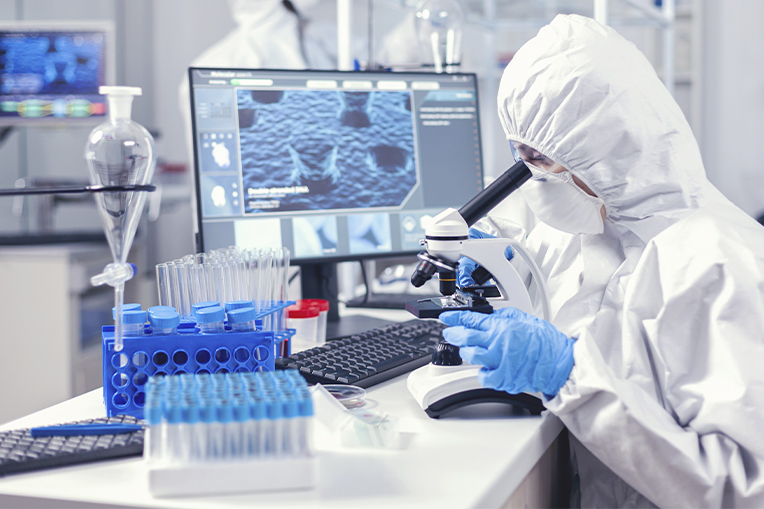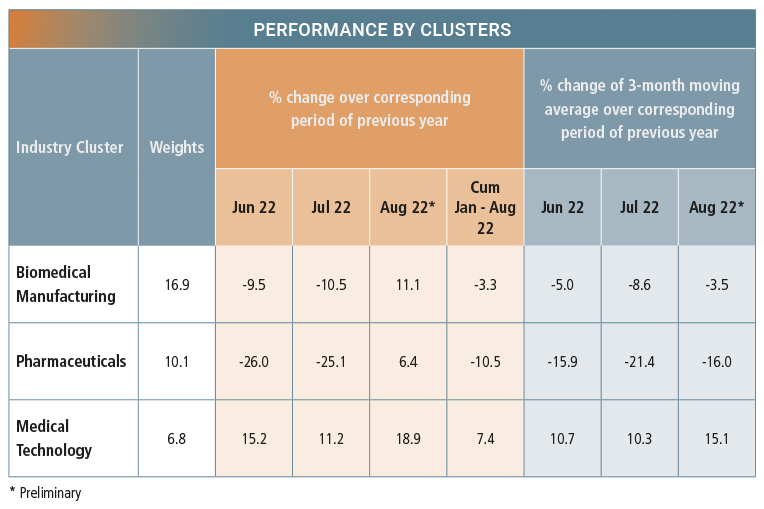
Asia-Pacific’s medical technology (MedTech) industry makes a steady climb up the MedTech global arena.
McKinsey reports that by 2023, the MedTech market in Asia-Pacific (APAC) will reach US$137 billion (S$184 billion) to become the second-largest regional market, overtaking Europe.
During the period (2017-2023), APAC will also be the major growth engine among global MedTech markets, contributing 35 percent of total incremental growth.
What drives the growth in MedTech? According to APACMed, rising healthcare costs, an aging demographic, an increase in chronic diseases and a growing population of discerning healthcare consumers who take a more proactive approach to personal health and demand a higher quality of care and lifestyle.
The global population is ageing, with Asia-Pacific likely to see the most rapid increase in older citizens between now and 2050. In a report released by the Government’s National Population and Talent Division on 27 September 2022, Singapore’s population is ageing rapidly, with the proportion of citizens aged 65 and above increasing to 18.4 percent in 2022. That is almost 1 in 5 citizens.
APAC’s growing economy and population provides an opportunity for progressive MedTech organisations to innovate and develop cost-effective solutions to address the region’s unmet healthcare needs.
In Singapore, the government identified MedTech as a key sector within the biomedical sciences industry for development. With Singapore’s existing capabilities in engineering, manufacturing and biomedical sciences, the nation is well placed to nurture a thriving MedTech sector to further boost the local economy.
MedTech in Singapore represents an important sector of the economy. The city-state is home to more than 60 multinational MedTech companies which sustains more than 9,000 jobs and undertakes a range of activities from manufacturing to research and development (R&D). Fifty of the world’s leading MedTech firms have set up their regional headquarters in Singapore and there are over 220 MedTech start-ups and small-medium enterprises.
A report on MedTech R&D in Singapore 2022, published by Ravenry revealed that Singapore is the current leader in Asia’s MedTech R&D scene accounting for SG$105 million of HealthTech funding which is 24 percent of total investment across the continent (except China and India). Singapore is the R&D centre for 30 global MedTech companies including Biosensors, Becton Dickinson, Alcon and Hill-Rom, as well as local start-ups such as HealthSTATS and Veredus Laboratories.
Over the past years, Singapore has seen an increased interest from established industry players seeking to tap into the country’s growing MedTech space. The market is very attractive for multinational companies: the US MedTech company Thermo Fisher Scientific established a research partnership with Singapore to develop new cloud-based solutions while Becton Dickinson, a global MedTech company with headquarter in Singapore opened an innovation center to develop new technologies.
10x Genomics, an American biotechnology company that designs and manufactures gene sequencing technology used in scientific research, chose Singapore as the location for their first manufacturing facility in Asia. The decision to set up in Singapore is due to our government’s commitment to the biotechnology industry, business-friendly practices, world-class manufacturing expertise and strong talent pool. The Asia-Pacific region is an important market for companies like 10x Genomics, representing 25 percent of global sales in the first half of 2021.
The Manufacturing 2030 plan, a 10-year plan to grow Singapore’s manufacturing sector by 50 percent was unveiled in 2021. At the opening of 10x Genomics’ Singapore Manufacturing and Commercial Hub on 25 October 2021, Minister of State (MOS) for Trade and Industry Alvin Tan reiterated the government’s commitment in supporting and growing the biomedical sector. He said, “We will do so by continuing efforts to attract leading companies to Singapore, strengthening our existing base of companies, expanding efforts to develop a robust pool of local talent, and enhancing research and innovation.”
Singapore is also making significant investments in advanced manufacturing technologies, to ensure that it remains attractive as a hub for the world’s leading MedTech manufacturers.
Under the national Research, Innovation and Enterprise 2025 (RIE 2025) plan, SG$25 billion is allocated for the research landscape, focusing on human health and potential. On top of funding, key technology initiatives in 3D printing, robotics and industrial internet of things have been launched to keep up with the rapid transformation of manufacturing that is happening globally.
At the opening of 10x Genomics Singapore, a collaboration with a local manufacturer, Venture Corporation was formed to provide sub-assembly and components of 10x Genomics Chromium instrument that would be sold globally.
“Singapore is a global hub for biotechnology with a thriving innovation ecosystem and strong research community,” said Serge Saxonov, Co-founder and CEO of 10x Genomics. “We sincerely thank the Economic Development Board of Singapore for their incredible support and partnership and the 10x teams in Singapore and California for their tremendous efforts in bringing this site online. We are thrilled to grow our presence here and are excited to contribute to Singapore’s culture of science and innovation as we work to fulfil the promise of this Century of Biology.”

Innovative R&D ecosystem
Singapore’s R&D ecosystem comprises many ministries, including the Ministry of Health, R&D funding providers like the National Medical Research Council, and R&D performers like hospitals, top universities, and research institutes. Singapore’s network of universities, research institutions and innovative start-ups also enable MedTech companies to tap a vibrant open innovation ecosystem.
With a strong presence of more than 25 R&D centres established by multinational MedTech companies and a local pool of over 220 MedTech start-ups and small-medium enterprises, MedTech companies have increasingly been plugging into this network of innovation, talent and ideas to develop next-generation products and solutions for the region.
Among some R&D developments that have been cultivated in this ecosystem are:
Selena+ AI algorithms for eye disease detection with SNEC, SERI and NUS School of Computing
Diabetic Macular Edema detection, glaucoma detection from optical coherence tomography scans, papilledema detection from fundus photos, myopic macular degeneration from fundus photos identification of optic nerve abnormality with high accuracy.
microRNA (miRNA) technology with MiRXES
The company manufactures miRNA detection and quantification kits for research and is developing miRNA-based liquid biopsy kits for gastric cancer, lung cancer, breast cancer and pancreatic cancer detection. The company was spun-off from the Bioprocessing Technology Institute of the Agency of Science Technology And Research (A*STAR) and is supported by Exploit Technologies and the National University of Singapore
Thermo Fischer Scientific project with A*STAR
First cloud-enabled instrument for improving lab productivity: multiple systems on a single platform to allow users to remotely monitor their experimental runs and results in real-time on mobile devices, as well as to perform preliminary analyses with a toolkit at their disposal.
Wearable device for arrhythmias with Biorithm
Wearable device that detects arrhythmias in real-time through sensing ECG pulse with Biorithm, a medical technology start-up spun off from Nanyang Technological University in Singapore.
Genomic sequence analysis to research institutes with Visuho
Singapore-based healthcare technology company that offers genomic sequence analysis to research institutes, health screening clinics, hospitals, and the pharmaceutical industry.
Microfluidic devices with AIM Biotech
Microfluidic devices for research applications, beginning with 3D cell culture systems
Microbial detection system with Biopsin
A revolutionary microbial detection system that provides gold standard detection of pathogens for F&B, water, consumer goods and pharmaceutical products in real time, with Biopsin, a Singapore startup.
Parameter sensors with Aerosens
Parameter sensors to measure differential pressure, temperature, relative humidity, carbon dioxide, carbon monoxide, and air quality.
Technology platform based on genetic engineering with Medisix Therapeutics
Technology platform based on genetic engineering to generate T cells for treatment of leukemias and lymphomas.
At present, more than 220 MedTech small- and medium-sized enterprises operate in Singapore, some of them are:
istoindex
Spin-off company from the Institute of Biotechnology and Nanotechnology (IBN), Agency of Science, Technology and Research (A*STAR), HistoIndex is a leading MedTech/Healthcare company that specialises in its proprietary integrated stain-free AI digital pathology platform. Enabled by Second Harmonic Generation (SHG) and Two-Photon Excitation (TPE) along with automated imaging analysis algorithms, the integrated platform accurately quantifies histological features and fine measurements that are critical for the evaluation of therapeutic efficacy in clinical trials. The stain-free AI platform is currently involved in multiple FDA clinical trials for Nonalcoholic Steatohepatitis (NASH). In addition, it has benefitted more than 150 research and academic institutes, CROs and biopharma companies around the world in drug discovery and development efforts for fibrotic diseases and cancers.
MiRxes
The spin off from Agency of Science, Technology and Research (A*STAR) uses microRNA technology for clinical purposes, such as blood tests for gastric, breast and lung cancers, and a pan-cancer screening test.
On 7 July 2022, MiRXES launched Project CADENCE (CAncer Detected Early caN be CurEd), the world’s first large-scale clinical research project for the discovery and validation of novel combinations blood-borne circulating microRNA (miRNA) and DNA methylation biomarkers that will lead to the development of a multi-cancer early detection test and high mortality cancers, including lung, breast, colorectal, liver, stomach (gastric), esophageal, ovarian, pancreatic, and prostate cancers.
Signed together with the National Cancer Centre Singapore, Nanyang Technological University, Singapore, (NTU Singapore), National University Hospital, Singapore General Hospital, Singapore Translational Cancer Consortium, Tan Tock Seng Hospital and Yong Loo Lin School of Medicine, National University of Singapore (NUS Medicine), the MoU represents a new public-private partnership where Project CADENCE aims to address the rising cancer incidence rate and economic impact in Singapore and globally through early detection.
Curiox Biosystems
A spin-off company from Agency for Science, Technology, and Research (A*STAR) in Singapore, Curiox brings together decades of scientific and engineering expertise in surface chemistry and life science instrumentation with the goal of overcoming critical challenges that slow the pace of life science research. By focusing on common assay steps where miniaturisation and automation are currently underutilised, Curiox develops innovative technologies that simultaneously improve both productivity and data quality

New MedTech trends featured at Medical Fair Asia 2022
Healthcare technology is advancing at a rapid pace with innovations and technologies in Artificial Intelligence (AI).
The healthcare landscape is being transformed with many new emerging healthcare technologies. Many of them address everyday challenges. At the Medical Fair Asia 2022, new MedTech trends were featured from wearable health-monitoring devices to radiation-free breast imaging scans, germ-killing surgical gloves and an electric ambulance vehicle.
Here are a few of the highlights that was mentioned in The Straits Times, published 31 August 2022.
A fitness wearable for muscle activity monitoring
Microtube Technologies’ product ARIS, is a fitness wearable sensor that measures quantitative muscle activity during sports and rehabilitation. By directly measuring muscle exertion during a workout, the user’s range of motion, workout consistency, muscle stability and fatigue level can be detected, which then allows the tracker’s AI algorithm to predict the user’s health profile and recommend next steps and exercise routines to take.
A key benefit of wearable technology is its ability to continuously monitor a wearer’s health and physiological state, and detect anomalies in real-time to allow for early intervention. More critically, it empowers users with actionable data to better manage their own health and medical conditions.
New ultrasound technology for breast imaging
Innovador Healthcare (Asia)’s latest Quantitative Transmission ultrasound technology offers a new way that is critical to early breast cancer detection. As it does not require compression and is radiation-free, the process is more comfortable and faster compared to the mammogram, and is suitable for dense breasts (prevalent in more than 70 percent of Asian women) and women with breast implants.
Germ-killing surgical gloves
Pentavest Holdings uses nanotechnology in its Pentanano surgical gloves. Their antimicrobial nano properties can break down the protein and fat layer of the microbes, thus destroying any microbes that come into contact with the glove immediately. A plus point of Pentanano gloves’ antimicrobial nano properties is that they are suitable for sensitive skin as it provides protective barrier for users.
New electric ambulance that allows on-the-road intensive care
A new EV ambulance produced by WAS, a leading manufacturer of special vehicles and ambulances, could potentially elevate the standard of pre-hospital emergency care. Compared to the standard van ambulances, the primary type of ambulance used in many countries, the EV box body ambulance offers more space and load capacity for medical equipment, enabling paramedics to provide intensive care even while on the road. Electric vehicles also produce less noise and vibration, which reduces the stress on both the patient and the paramedics.
Monthly Manufacturing Performance August 2022
On a year-on-year basis, Singapore’s manufacturing output increased 0.5 percent in August 2022. Excluding biomedical manufcturing, output declined 1.2 percent.
Cluster Performance
Biomedical manufacturing: Output increased 11.1 percent in August 2022 on a year-on-year basis. The medical technology segment expanded 18.9 percent with higher demand for medical devices from the US and China. The pharmaceuticals segment grew 6.4 percent due to a different mix of active pharmaceutical ingredients being produced. On a year-to-date basis, output of the biomedical manufacturing cluster declined 3.3 percent, compared to the same period a year ago.

Singapore Economic Development